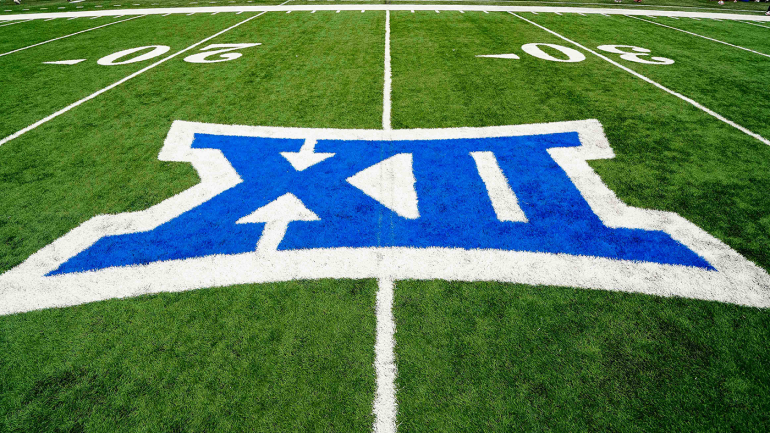
KANSAS CITY, Mo. -- The Big 12 could have a new media rights deal in place with ESPN and Fox within a matter of weeks, sources tell CBS Sports.
The league has been aggressively pursuing a new deal ahead of the conference's formal negotiating window in 2024. The Big 12's current contract with ESPN and Fox expires after the 2024-25 academic year.
While a new deal this far ahead of the expiration of the current contract is not assured, it could position the Big 12 ahead of the Pac-12 in terms of securing more lucrative broadcast windows. The Pac-12 is currently on the open market for a new contract as its current deal expires in 2024.
Big 12 commissioner Brett Yormark told CBS Sports on Wednesday, if a new deal isn't finalized in the near term, "there is the option to wait 16 months [for the formal negotiating window to begin]."
Yormark expects per-school media rights revenue to increase from its current deal despite the losses of Texas and Oklahoma to the SEC beginning in 2025.
With those two giants, Big 12 schools are currently receiving $43 million annually for their media rights, a figure that includes revenue from the NCAA Tournament and bowl games. Former commissioner Bob Bowlsby testified to the Texas legislature -- shortly after the loss of Texas and Oklahoma -- that the value of the conference would decrease by 50% without those programs.
Asked how a new media rights figure could surpass $43 million per program, Yormark told CBS Sports, "I'm a good salesman." He stressed the value of live sports -- the unknown of who is going to win -- which has long been the attraction of TV rights.
"There is nothing more valuable than live sports right now. Generally speaking, there is a huge appetite for what we sell. That in itself gets us to a higher place," Yormark said.
Whatever the outcome, the Big Ten is expected to lead all conferences in 2023 when its new deal with CBS, Fox and NBC begins. Once USC and UCLA join in 2024, Big Ten schools are expected to make $75 million to $80 million per year.
"I don't believe in flat," Yormark said of his conference. "We've got to go up. We've made a very compelling case. We're also selling a future vision. If you buy into my vision of where we're going to take this conference, how we nationalize, how we build our brands -- in partnership -- then you'll hopefully get to a point where you rationalize the number that I need in order to do this deal."
Yormark mentioned raising ticket prices to the Big 12 Basketball Tournament as a way to increase revenue. However, media rights are the heart of any conference's revenue. The payout indicates the worth to a rightsholder to televise that league's group of schools. The payout is typically backloaded, so more money is earned at the end of the deal than the beginning.
"I'm going to create … new events, go to new markets, do media blitzes, use music, celebratize our events, use influencer marketing," Yormark said.
The Big 12 continues to discuss ways to position itself as the newly reconfigured league that debuts in 2025 will include BYU, Cincinnati, Houston and UCF.
"Although the economics are important, it's not the only thing I'm looking for. I want partners that want to market, promote and story tell," Yormark said.
CBS Sports reported last month that the Pac-12 would be in danger of collapsing if the Big Ten was successful in adding California, Oregon, Stanford and Washington. Big Ten commissioner Kevin Warren, who had been public about his interest in expansion, has cooled on the subject recently, sources said.
However, the Big 12 remains interested in adding a Pacific time zone presence to its conference footprint. CBS Sports reported in July that the Big 12 was in discussions with Pac-12 schools to join the league. That same month, Pac-12 commissioner George Kliavkoff subsequently said, "No Pac-12 school is joining the Big 12."
If the Pac-12 signs a media rights deal that is heavy with streaming content, industry sources have speculated that might convince some Pac-12 schools to move to the Big 12 because of the decreased visibility of the Pac-12 without a linear cable home.
If that happens, the Big 12 could promise a coast-to-coast conference located in four time zones with games positioned all four windows: noon, mid-afternoon, prime time and late night.
ESPN is believed to be seeking content in that fourth window as its Pac-12 contract expires. Whether that's with the Pac-12, Big 12 or a combination of the two leagues remains to be seen.





















